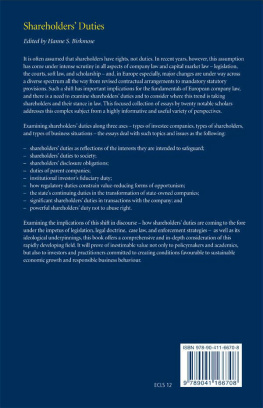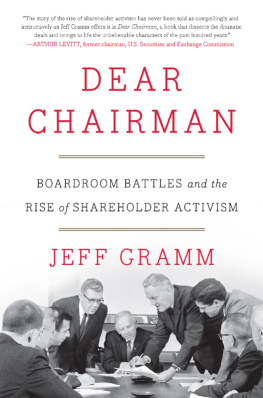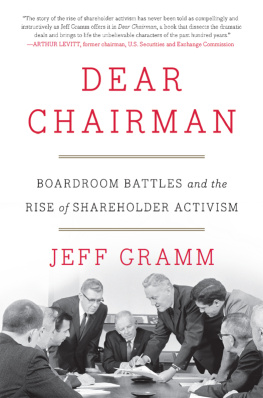Praise for The Shareholder Value Myth
This book threatens to trigger an avalanche of new thinking about corporations. Written by one of the most respected theorists in corporate governance, it takes aim at the smug profit-only complacency found in business schools and boardrooms. Anyone who reads it will be forced to thinkand think again.
Thomas Donaldson, Mark O. Winkelman Professor, The Wharton School, University of Pennsylvania
The only antidote to prevailing bad theory is calm, careful, plainspoken, and relentless argumentation that peels away the distracting layers of abstract mumbo jumbo to expose the lunacy of the underlying theory for all to see. Lynn Stout does the world a great favor in exposing shareholder value theory for what it is: flawed and damaging theory. Comprehensive yet brief, profound yet enjoyable, this is a must-read for anyone who cares about the future of democratic capitalism.
Roger Martin, Dean, Rotman School of Management, University of Toronto, and author of Fixing the Game
It is widely believed that corporations exist solely to maximize profits. It is also widely believed that this corporate purpose is prescribed by law. Lynn Stout shows that these influential beliefs are both wrong and very likely destructive.
Ralph Gomory, Research Professor, New York University; President Emeritus, Alfred P. Sloan Foundation; and former Senior Vice President for Science and Technology, IBM Corporation
Professor Stout is a leader of a growing group of corporate executives, economists, lawyers, and thoughtful investors who have embraced the concept that corporations should, and indeed must, be managed in the interests of all their constituents. This book is a very readable explanation of the adverse impact that ignoring the interests of all constituents and short-termism have had on not just employees, customers, suppliers, communities, and the economy as a whole but the very shareholders themselves.
Martin Lipton, Senior Partner, Wachtell, Lipton, Rosen & Katz
Lynn Stout raises a critical question about American capitalism: what is the purpose of the public corporation? For too many years there has been an uncontested assertion that all that matters is creating shareholder wealth. This is an underlying cause of many of the ills facing American society, and this is therefore a critically important book!
Jay Lorsch, Louis Kirstein Professor of Human Relations, Harvard Business School, and author of Back to the Drawing Board (with Colin B. Carter) and Pawns or Potentates
Lynn Stout presents a thoroughly researched and articulated case against shareholder value exclusivity. It serves the grand purpose of illuminating the debate in the hope of finding a reasoned result.
Ira Millstein, Director, Columbia Law School and Columbia Business School Program on Global, Economic, and Regulatory Interdependence, and Theodore Nierenberg Adjunct Professor of Corporate Governance, Yale School of Management
Lynn Stouts engaging book deals a knockout blow to the mantra of shareholder value that has come to dominate corporate boardrooms in the last two decades. While she makes her case in a readable and entertaining way, her message is very serious: the obsession that the business community has with maximizing shareholder value is making US corporations weaker, not stronger.
Dr. Margaret M. Blair, Professor of Law, Milton R. Underwood Chair in Free Enterprise, Vanderbilt University Law School
Lynn Stout kicks another brick off of the mantle of short-termism, showing again why choosing to myopically focus on short-term value not only can destroy longer-term performance but also is legally inconsistent with leading corporate governance principles, incentives, and actions that aspire to more sustainable value creationover the long term and for all stakeholders, including shareholders.
Dean Krehmeyer, Executive Director, Business Roundtable Institute for Corporate Ethics
THE
SHAREHOLDER VALUE MYTH
How Putting Shareholders
First Harms Investors,
Corporations, and the Public
LYNN STOUT

The Shareholder Value Myth
Copyright 2012 by Lynn Stout
All rights reserved. No part of this publication may be reproduced, distributed, or transmitted in any form or by any means, including photocopying, recording, or other electronic or mechanical methods, without the prior written permission of the publisher, except in the case of brief quotations embodied in critical reviews and certain other noncommercial uses permitted by copyright law. For permission requests, write to the publisher, addressed Attention: Permissions Coordinator, at the address below.

| Berrett-Koehler Publishers, Inc.
235 Montgomery Street, Suite 650
San Francisco, California 94104-2916
Tel: (415) 288-0260, Fax: (415) 362-2512
www.bkconnection.com |
Ordering information for print editions
Quantity sales. Special discounts are available on quantity purchases by corporations, associations, and others. For details, contact the Special Sales Department at the Berrett-Koehler address above.
Individual sales. Berrett-Koehler publications are available through most bookstores. They can also be ordered directly from Berrett-Koehler: Tel: (800) 929-2929; Fax: (802) 864-7626; www.bkconnection.com Orders for college textbook/course adoption use. Please contact Berrett-Koehler: Tel: (800) 929-2929; Fax: (802) 864-7626.
Orders by U.S. trade bookstores and wholesalers. Please contact Ingram Publisher Services, Tel: (800) 509-4887; Fax: (800) 838-1149; E-mail: customer.service@ingrampublisherservices.com ; or visit www.ingrampublisherservices.com /Ordering for details about electronic ordering.
Berrett-Koehler and the BK logo are registered trademarks of Berrett-Koehler Publishers, Inc.
First Edition
Paperback print edition ISBN 978-1-60509-813-5
PDF e-book ISBN 978-1-60509-815-9
IDPF e-book ISBN 978-1-60509-816-6
2012-1
Cover design: Nicole Hayward
Project management: Lisa Crowder, Adept Content Solutions, Urbana, IL
Full-service book production: Adept Content Solutions, Urbana, IL
Contents
Preface
Back when I was a law school student in the early 1980s, my professors taught me that shareholders own corporations and that the purpose of corporations is to maximize shareholder value. I was just out of college at the time and not very familiar with the business world, so this made sense enough to me. When I first began lecturing and writing in business law myself, I incorporated the shareholder value thinking that I had been taught into my own teaching and scholarship.
It soon became apparent to me there was a problem with this approach. The more I read business law cases, the more obvious it became that U.S. corporate law does not, in fact, require corporations to maximize either share price or shareholder wealth. My first reaction was puzzlement and frustration. Shareholder value thinking was almost uniformly accepted by experts in law, finance, and management. Why then, I asked myself, wasnt it required by the actual rules of corporate law?
Next page










